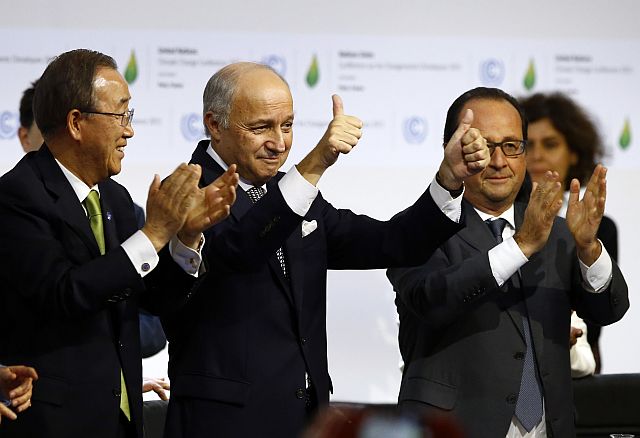
French Foreign Minister and President of the COP21 Laurent Fabius, center, flashes the thumbs-up sign while United Nations Secretary General Ban Ki-moon, left, and French President François Hollande applaud after the final conference of the COP21, the United Nations conference on climate change, in Le Bourget, north of Paris. (AP PHOTO)
Nearly 200 nations pledge to slow global warming
Le Bourget, France — Nearly 200 nations adopted the first global pact to fight climate change on Saturday, calling on the world to collectively cut and then eliminate greenhouse gas pollution but imposing no sanctions on countries that don’t.
The “Paris agreement” aims to keep global temperatures from rising another degree Celsius (1.8 Fahrenheit) between now and 2100, a key demand of poor countries ravaged by rising sea levels and other effects of climate change.
Loud applause erupted in the conference hall after French Foreign Minister Laurent Fabius gaveled the agreement. Some delegates wept and others embraced.
The agreement, South African Environment Minister Edna Molewa said, “can map a turning point to a better and safer world.”
“This is huge,” tweeted US President Barack Obama. “Almost every country in the world just signed on to the #ParisAgreement on climate change — thanks to American leadership.”
In the pact, the countries commit to limiting the amount of greenhouse gases emitted by human activity to the same levels that trees, soil and oceans can absorb naturally, beginning at some point between 2050 and 2100.
In practical terms, achieving that goal means the world would have to stop emitting greenhouse gases altogether in the next half-century, scientists said. That’s because the less we pollute, the less pollution nature absorbs.
Achieving such a reduction in emissions would involve a complete transformation of how people get energy, and many activists worry that despite the pledges, countries are not ready to make such profound and costly changes.
The deal now needs to be ratified by individual governments — at least 55 countries representing at least 55 percent of global emissions — and would take effect in 2020. It is the first pact to ask all countries to join the fight against global warming, representing a sea change in UN talks that previously required only wealthy nations to reduce their emissions.
Disclaimer: The comments uploaded on this site do not necessarily represent or reflect the views of management and owner of Cebudailynews. We reserve the right to exclude comments that we deem to be inconsistent with our editorial standards.




